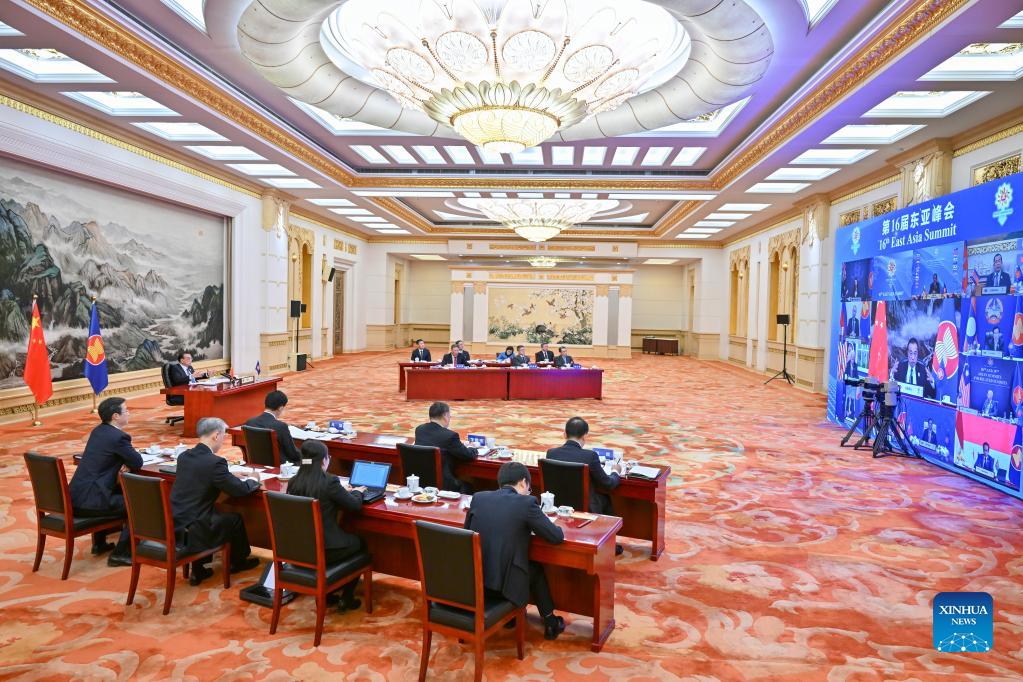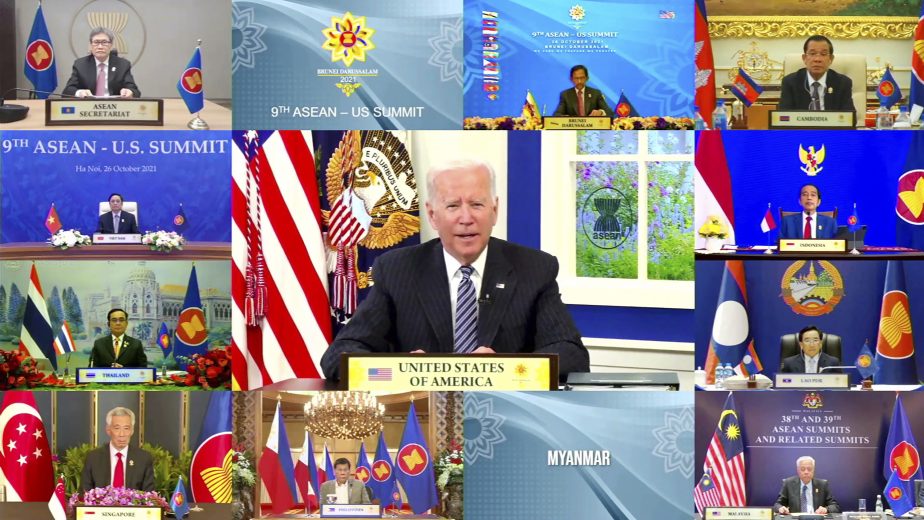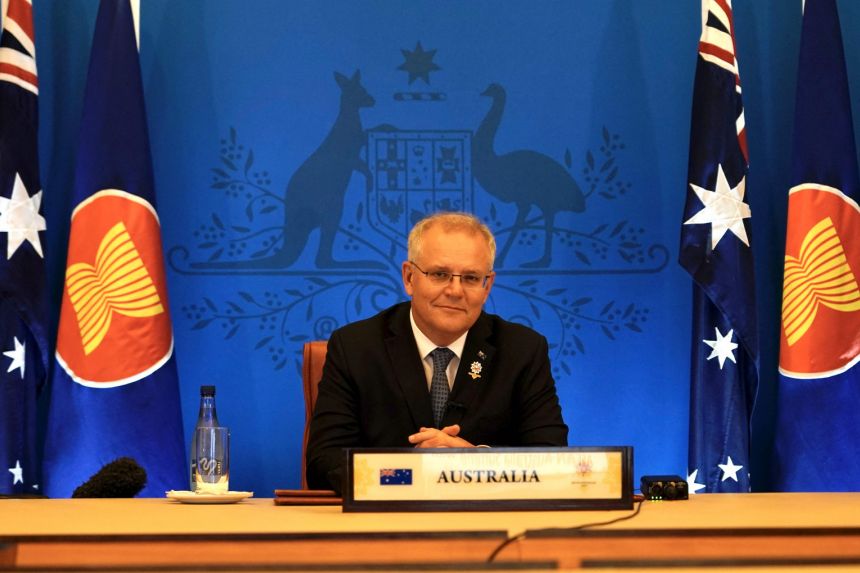Highlights of the 16th East Asia Summit

The annual East Asia Summit was held on October 26 via video conference.
The leaders of Association of Southeast Asian Nations (ASEAN), the U.S., China, Australia, New Zealand, Japan, South Korea, India, and Russia joined the virtual session to discuss regional and international challenges, including the climate crises and the COVID-19 pandemic.
The U.S. President Joseph Biden at the East Asia Summit meeting told the ASEAN leaders that the United States would stand with them in defending freedom of the seas and democracy.
According to the U.S. White House statement, President Biden reiterated “the U.S. commitment to the international rules-based order and expressed concern over threats to that order... [and] made clear that the United States will continue to stand with allies and partners in support of democracy, human rights, rule of law, and freedom of the seas.
This was the first time in four years that the U.S. president participated in a virtual summit with leaders of the ASEAN. During the meeting, President Biden stated that the U.S. would start talks with partners in the Indo-Pacific about developing a regional economic framework.
While addressing the summit, which brought together the leaders of the 10-nation ASEAN with regional partners, President Biden highlighted that “The U.S. is committed to Taiwan. In fact, that commitment is rock solid and consistent across administrations. It continues to be the maintenance of peace and stability across the Taiwan Straits and within the region.”
The U.S. president also called China's actions towards Taiwan “coercive” and a “threat” to the stability of the whole region. President Biden added that “We are deeply concerned by China's coercive and proactive actions,” and accused China of threatening regional peace and stability.
The virtual meeting of the East Asia Summit was also attended by Chinese Premier Li Keqiang. Chinese Premier Li told the participants of the summit that “The South China Sea is our common home” and “upholding peace, stability, freedom of navigation, and overflight in the South China Sea was in everyone's interest.”
 Chinese Premier Li Keqiang attends the 16th East Asia Summit via video link at the Great Hall of the People in Beijing, China, on October 27, 2021 (Image Credit: Xinhua/Zhang Ling)
Chinese Premier Li Keqiang attends the 16th East Asia Summit via video link at the Great Hall of the People in Beijing, China, on October 27, 2021 (Image Credit: Xinhua/Zhang Ling)
Chinese premier proposed a four-point proposal during the summit, calling all parties “to respect each other” and “join hands” to work together for 1) combating the COVID-19 pandemic; 2) promoting “all-around economic recovery”; 3) promoting “green development” and face the climate change challenge; and 4) upholding “regional peace and stability” by supporting the “centrality of ASEAN”.
In recent weeks, China has increased its military and political pressure on Taiwan, which led to the escalation of tensions between Taipei and Beijing. The region has also become a strategic arena for China and the U.S., with Beijing claiming most of the South China Sea and Washington increasing its naval presence in the name of freedom of navigation.
The U.S. participation in the summit shows the Biden administration’s efforts to increase the U.S. presence in the region, as the ASEAN region holds strategic importance in Washington’s Indo-Pacific strategy.
Last week (on Oct 21) President Biden said that the U.S. is obliged by a 1979 law to provide Taiwan with the means to defend itself, and Washington would help Taipei defend itself from Beijing’s aggression. However, experts have questioned the U.S. policy of “strategic ambiguity” and how the U.S. would respond to such threats.
On October 22, during the White House press briefing spokeswoman Jen Psaki responded to a question on President Biden's intention to move away from strategic ambiguity, by stating that “Our policy has not changed. He [Biden] was not intending to convey a change in policy, nor has he made a decision to change our policy.”
Chinese officials expressed displeasure over the U.S. president’s comments, and urged Washington “not to send the wrong signals to the forces of Taiwan independence, to avoid seriously harming Sino-US ties and peace and stability in the Taiwan Strait.”
In response to President Biden’s statement, Chinese Foreign Ministry spokesperson Wang Wenbin said that “No one should underestimate the strong resolve, determination, and capability of the Chinese people to safeguard national sovereignty and territorial integrity.”
“We urge the US side to earnestly abide by the one-China principle and the three China-US joint communiqués, be cautious in words and deeds on the Taiwan question, and refrain from sending any wrong signals to secessionist, so as not to seriously damage China-US relations and peace and stability across the Taiwan Straits,” Wang added.
China has repeatedly warned the U.S. that Beijing would never compromise on its “territorial integrity” and on matters related to safeguarding the sovereignty and security of China.
Russian President Vladimir Putin also addressed the summit via video link. Putin stressed on the urgency to set up a regional mechanism for cooperation in the fight against the COVID-19 pandemic.
Russian president also highlighted “the need to provide people with mental healthcare services and psychological support is crucial amid the pandemic and related severe restrictions, including quarantines and self-isolation… This is why we undoubtedly support an initiative to adopt a separate statement on the matter at today's meeting, presented by Brunei's Chairmanship.”
President Putin said Russia would present “specific proposals on the matter through expert channels in the near future.”
Myanmar Issue
The three-day East Asia Summit started without Myanmar’s participation. However, Myanmar’s foreign ministry said in a statement on Tuesday night that “Myanmar will continue to constructively cooperate with ASEAN, including in implementing the five-point consensus.”
During private conversations with ASEAN leaders, President Biden denounced the “horrific violence” by the military junta in Myanmar and urged the country to return to democracy and release political prisoners.
 U.S. President Joseph Biden addressing at the 16th East Asia Summit via video link on October 27, 2021.
U.S. President Joseph Biden addressing at the 16th East Asia Summit via video link on October 27, 2021.
“In Myanmar, we must address the tragedy caused by the military coup which is increasingly undermining regional stability,” President Biden told the ASEAN leaders.
According to the White House statement “The United States stands for the people of Myanmar and calls for the military regime to end the violence, release all political prisoners and return to the path of democracy.”
However, Chinese Premier Li stated that “Myanmar is an important participant in East Asia cooperation,” and urged that the issues should be handled in the “ASEAN way”, by promoting Myanmar's peace and reconciliation process.
The summit host Sultan Hassanal Bolkiah of Brunei also reiterated that “Myanmar is an integral part of the ASEAN family, and their membership has not been questioned… ASEAN will always be there for Myanmar.”
Incoming ASEAN Chair Cambodia’s Minister of Foreign Affairs Mr. Prak Sokhonn also stated that “While we all respect the principle of non-interference into domestic affairs of member states, the situation in Myanmar continues to be a subject of grave concern… [and] has negative impacts on the region, the credibility of the association and on the people of Myanmar, our brothers and sisters.”
U.S.-ASEAN Economic Cooperation
The leaders of ASEAN and the U.S. agreed to support “implementation of the ASEAN-U.S. Trade and Investment Framework Arrangement (TIFA) and Expanded Economic Engagement (E3) Work Plan, including the United States Agency for International Development’s (USAID’s) Inclusive Growth in ASEAN through Innovation, Trade and E-Commerce (IGNITE) programme, and deeper cooperation through the ASEAN Digital Integration Index, the U.S.-ASEAN Connect Digital Economy Series and the Digital Connectivity and Cybersecurity Partnership (DCCP), and other initiatives on digital literacy, digital development and integration,” the White House statement read.
The leaders also recognized the important role of smart digital development that can create resilient economies amidst “COVID-19 pandemic” and other “economic shocks”, and ensure that the “economic gains can be accessed by all sectors of the population and potentially enabling a sustainable, inclusive and resilient economic growth, especially during and in the post-pandemic era.”
President Biden reiterated the U.S. commitment to the Indo-Pacific, and outlined his vision for the region. The American president told the ASEAN leaders that the U.S. seeks to support development in ASEAN and promote open, connected, prosperous, resilient, and secure region.
The U.S. president also highlighted the importance of the “ASEAN Outlook on the Indo-Pacific and the ASEAN Comprehensive Recovery Framework and its Implementation Plan in guiding ASEAN towards inclusive digital transformation in preparation for the Fourth Industrial Revolution as outlined in the Consolidated Strategy for the Fourth Industrial Revolution for ASEAN, as well as to boost economic growth and improve society.”
During the talks, President Biden also announced that the “United States will explore with partners the development of an Indo-Pacific economic framework that will define our shared objectives around trade facilitation, standards for the digital economy and technology, supply chain resiliency, decarbonization and clean energy, infrastructure, worker standards, and other areas of shared interest.”
Australia-ASEAN - Comprehensive Strategic Partnership Agreement
On October 27, Australia and ASEAN at a virtual regional summit agreed to establish a “comprehensive strategic partnership”.
Speaking on the second day of virtual meetings, Australian Prime Minister Scott Morrison said that the growth of ASEAN supports regional stability and Australia's prosperity. Australian prime minister emphasized that the comprehensive strategic partnership would strengthen diplomatic and security ties between Australia and ASEAN partners. The pact also reflects Australia's ambition to play a key role in the region.
“We want our cooperation to reach new heights… We will back it with substance that positions our partnership to address complex challenges in the future,” Morrison said.
Australia also announced that it would invest A$124 million (S$126 million) on security, climate and health efforts, on various projects, including counter-terrorism, combating transnational crime, health and energy security in Southeast Asia.
 Australian Prime Minister Scott Morrison attends the 16th East Asia Summit via video link.
Australian Prime Minister Scott Morrison attends the 16th East Asia Summit via video link.
Australian prime minister also stated that the AUKUS agreement between Australia, the UK, and the U.S. would add to “network of partnerships that support regional stability and security.”
Australian Prime Minister Morrison added “AUKUS does not change Australia's commitment to ASEAN or the ASEAN outlook on the Indo-Pacific. It reinforces it. It reinforces the backing that we have for an ASEAL-led regional architecture."
















